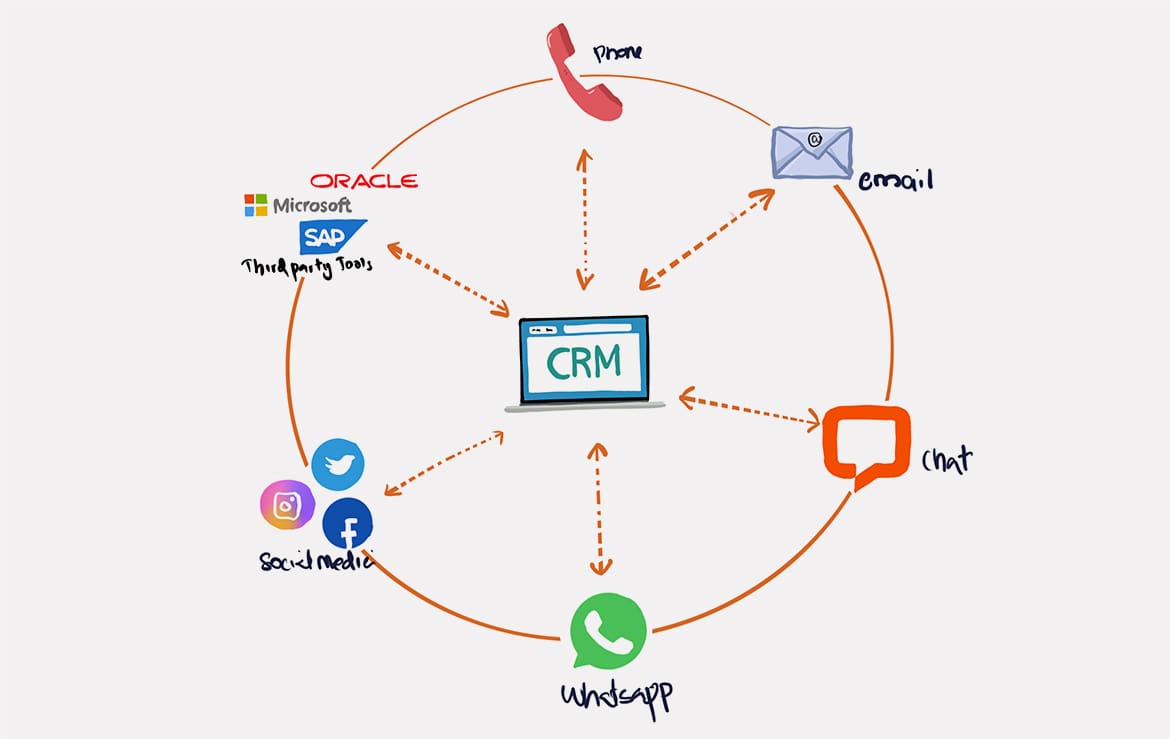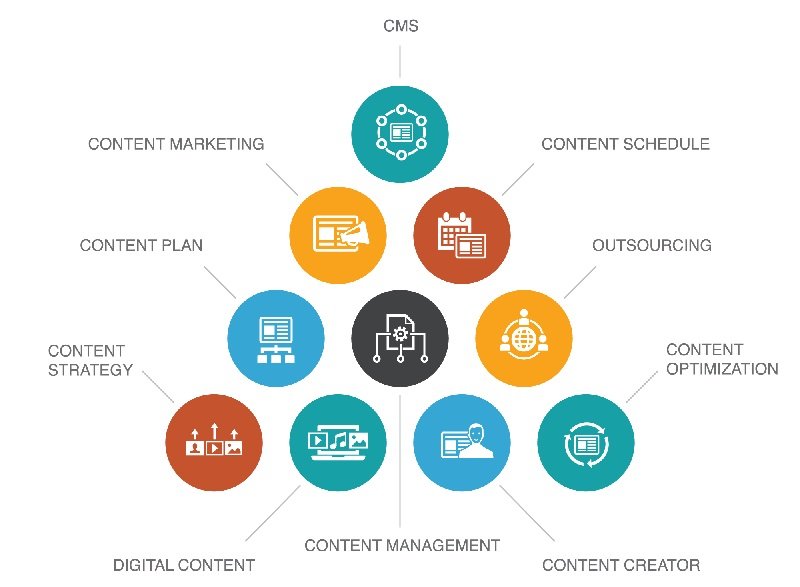CRM - Optimize customer relationship management for your company
Published

What is CRM and how can it transform your business
Customer Relationship Management (CRM) is a strategy and technology that helps companies to manage and improve customer relationships. At its core, it is about collecting, analyzing and effectively using customer information to better understand customers and meet their needs. CRM systems provide a central platform for storing customer contact data, sales histories, interactions and much more. The transformation that CRM can bring to your business is significant. By implementing a CRM system, you can:
- Improve customer insights: CRM enables you to create detailed customer profiles and analyze behavioral patterns. This leads to a better understanding of your customers and their preferences.
- More effective sales processes: CRM helps sales teams to track leads, organize sales activities and identify sales opportunities. This allows you to increase efficiency and better manage sales success.
- Kundenservice optimieren: A CRM enables a faster response to customer inquiries and problems. You can automate customer service processes and provide personalized support.
- Adapting marketing strategies: By analyzing customer behavior and preferences, you can create more targeted marketing campaigns and provide personalized content.
- Promote growth: CRM helps to retain existing customers and attract new ones. A satisfied customer is more likely to buy from you again and recommend your company to others.
Overall, CRM can transform your business by helping to strengthen customer relationships, optimize processes and ultimately increase the growth and success of your company. It is an essential strategy that is crucial in today's competitive business world.
The best CRM tools and platforms for your business needs
Choosing the right customer relationship management (CRM) tool or platform is critical to meeting the specific needs of your business. Here are some of the best CRM tools and platforms that can help you manage your customer relationships and optimize your business processes:
- Salesforce: Salesforce is one of the best-known and most powerful CRM platforms. It offers a wide range of functions for sales, marketing and customer service. Its adaptability and wide range of extensions make it ideal for companies of all sizes.
- HubSpot CRM: HubSpot CRM is a user-friendly platform with strong sales and marketing features. It offers a free starter package and integrates seamlessly with other HubSpot tools to increase efficiency.
- Zoho CRM: Zoho CRM is a cost-effective solution with extensive functions. It offers sales automation, analytics tools and integrations with third-party applications.
- Microsoft Dynamics 365: Microsoft's CRM solution, Dynamics 365, is particularly suitable for companies that already use Microsoft products. It offers seamless integration with Office 365 and advanced AI functions.
- Pipedrive: Pipedrive is tailored to the needs of smaller companies and focuses on the sales process. The intuitive user interface and sales pipeline tracking are its strengths.
Choosing the right CRM tool or platform depends on the individual requirements of your company. Consider factors such as company size, budget and required functions. A well-chosen CRM tool can increase efficiency, strengthen customer relationships and ultimately help grow your business. It's important to compare the options and choose the one that best suits your organization.
Step-by-step guide to implementing a successful CRM system
Successfully implementing a Customer Relationship Management (CRM) system requires careful planning and implementation. Here is a step-by-step guide that can help you successfully implement your CRM system:
- Target definition: Start by defining clear goals for your CRM implementation. What specific problems do you want to solve with CRM? Which business processes should be improved?
- Selection of the CRM tool: Choose the CRM tool or platform that best suits your requirements. Consider functions, costs, scalability and user-friendliness.
- Put together a project team: Put together a team that is responsible for the implementation. This should include a mix of IT experts, sales experts and other relevant stakeholders.
- Understand user requirements: Explore the requirements of your users and teams to ensure that the CRM system meets their needs. This includes training and training materials.
- User-defined customizations: Customize the CRM system to your specific business processes and workflows. This can include the customization of data fields, report structures and automation.
- Data migration: Transfer existing customer data to the CRM system. Ensure that the data quality is maintained and clean up if necessary.
- Training and education: Train your team on how to use the CRM system. Provide training and resources to ensure that all users can use the system effectively.
- Testphase: Carry out comprehensive tests to ensure that the CRM system works smoothly. Identify and fix any problems or errors.
- Pilotphase: Launch the CRM system in a limited pilot phase before rolling it out to the entire company. Collect feedback and make adjustments.
- Implementation and training: Roll out the CRM system gradually throughout your company. Provide ongoing training and support for users.
Careful implementation is the key to a successful CRM system that improves your customer relationships and business processes. Track your goals, listen to your users' feedback and adjust your CRM system as needed to ensure it is working optimally. With a well thought out implementation, you can take full advantage of a CRM system and set your business up for success.
The benefits of CRM for customer service, sales and marketing
A well-implemented Customer Relationship Management (CRM) system offers numerous advantages for various areas of the company, especially for customer service, sales and marketing. Here are some of the key benefits for these areas:
- Kundenservice: CRM enables the customer service team to access comprehensive customer profiles and histories. This leads to a better customer experience as employees can respond quickly to inquiries and customer issues are resolved more efficiently. Personalization of customer service interactions is facilitated as customer preferences and needs are easily accessible.
- Distribution: CRM provides sales teams with valuable tools for tracking leads and sales opportunities. Sales staff can better manage the sales process, set priorities and shorten the sales cycle. The automation of tasks such as quote generation and follow-ups increases efficiency and boosts sales.
- Marketing: In marketing, CRM enables the creation of targeted campaigns and the segmentation of the target group based on customer behavior and preferences. This leads to a higher conversion rate and better use of the marketing budget. Marketing teams can also track and optimize the effectiveness of their campaigns more easily using analytics and reports.
In addition to these specific benefits, CRM promotes collaboration and information sharing between these departments. An integrated CRM system ensures that all teams have access to up-to-date customer information, leading to better collaboration and coordinated activities. This helps the entire company to work more efficiently and increases customer satisfaction. Overall, CRM is a powerful tool that helps companies strengthen customer relationships, optimize sales processes and improve marketing campaigns. The benefits extend across different areas of the business and help to ensure long-term growth and success.
CRM security: How to protect your customers' data and ensure data privacy
Customer data security is paramount, especially in a Customer Relationship Management (CRM) system that contains a wealth of sensitive information. Here are some security best practices to help protect your customers' data and ensure privacy:
- Data protection guidelines: Establish clear data protection guidelines and ensure that all employees understand and comply with them. This creates an awareness of data protection throughout the company.
- Control user access: Limit access to CRM data to authorized users and teams. Assign individual access rights based on the respective tasks and responsibilities.
- Strong authentication: Implement strong password policies and require the use of multi-factor authentication to secure access to the CRM system.
- Data encryption: Encrypt stored data and transmissions to ensure that even in the event of a data leak, the information cannot be read easily.
- Regular audits: Carry out regular security audits and checks to identify and eliminate potential vulnerabilities. This helps to identify and rectify security-related problems at an early stage.
- Backup strategy: Implement regular backups of your CRM data so that you can restore it quickly in the event of a data loss or security breach.
- Raise safety awareness: Train your employees in security awareness. This includes training on recognizing phishing attacks and other cyber threats.
- Compliance with regulations: Make sure you comply with all relevant data protection regulations and laws, especially if your customers come from different regions.
Implementing these security practices is critical to maintaining the trust of your customers and avoiding potential legal consequences. A data breach can have a serious impact on your company's reputation. Therefore, it is of utmost importance to implement and regularly review appropriate security measures to ensure the integrity and confidentiality of customer data in your CRM system.








